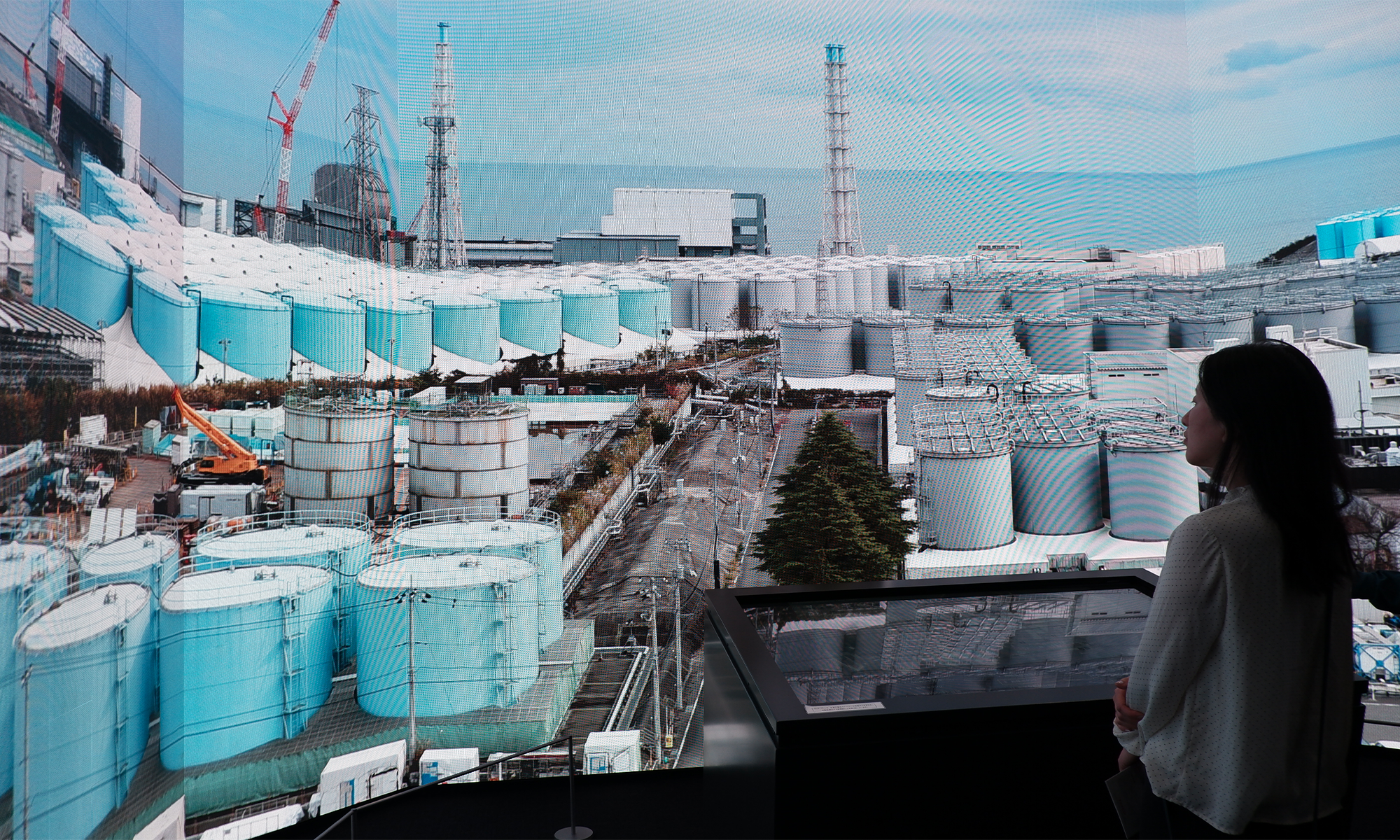
A GT reporter watches a video of the storage tanks of nuclear-contaminated wastewater at the Fukushima Daiichi Nuclear Power Plant at the TEPCO Decommissioning Archive Center on May 10, 2023. Photo: Xu Keyue/GT
Japan's unilateral decision to discharge nuclear-contaminated wastewater into the sea disregards international law and public opinion, said analysts on Sunday, one day before Tokyo Electric Power Company (TEPCO), the operator of the crippled Fukushima Daiichi nuclear power plant, starts trial operations of equipment for dumping nuclear-contaminated wastewater into the Pacific Ocean.
Some analysts believe that resisting goods with potential nuclear radiation contamination risks can be extended to other regions apart from Fukushima in Japan and products beyond seafood in accordance with the relevant import regulations, which would exert greater pressure on the Japanese government by consumers.
Fukushima media reported that the trial operation will be carried out on Monday by mixing fresh water and seawater, and will take 10 days to two weeks to check whether the specified amount of water can flow to the sea and whether the shutoff device can shut off water in the event of an emergency.
Japan's unilateral discharge of nuclear nuclear-contaminated wastewater is not in line with the spirit of the UN Convention on the Law of the Sea, said Tse Chin-wan, secretary for the Environment and Ecology of China's Hong Kong Special Administrative Region, on Thursday, adding that imports of seafood from Fukushima and nearby high-risk areas will be banned in Hong Kong at once if Japan starts to dump nuclear-contaminated water into the Pacific Ocean.
Seafood from outside high-risk areas in Japan would also need to provide radiation test reports before it can be sold in local markets in Hong Kong, he added.
According to a report issued by the plant's operator Tokyo Electric Power Company (TEPCO) on June 5, the radioactive elements in marine fish caught in the harbor of the Fukushima Daiichi Nuclear Power Plant far exceeded safety levels for human consumption, with the content of Cs-137 reaching 180 times that of the standard maximum stipulated in Japan's food safety law.
South Korea also announced it would maintain a ban on imports of seafood from Japan's Fukushima Prefecture, according to reports from Nikkei Asia on April 30. The country has for the past decade banned imports of food from the area due to concerns over food safety and fears of radiation contamination following the 2011 nuclear disaster.
In 2019, South Korea won the bulk of its appeal in a dispute at the World Trade Organization over import bans and testing requirements it had imposed on Japanese seafood in the wake of the Fukushima nuclear disaster.
The case of South Korea serves as a valuable reference for China and other countries, as it demonstrates that a resistance against potentially radiation-contaminated products is not limited to seafood from Fukushima alone, Chang Yen-chiang, director of the Yellow Sea and Bohai Sea Research Institute of Dalian Maritime University, told the Global Times on Sunday.
Resisting goods with potential nuclear radiation contamination risks can be extended to other regions apart from Fukushima in Japan and products beyond seafood in accordance with the relevant import regulations, Chang remarked, adding that this would exert greater pressure on the Japanese government by consumers.
Japan's exports of agricultural, forestry and fishery products and food products totaled 1,243.3 billion yen ($9.3 billion) for the 11 months through November 2022, hitting an annual record with one month left, according to the farm ministry.
The result represents a 15.4 percent increase from the same period a year ago, led by fisheries products.
One possible reason for the increase in Japan's fishery products exports is that local consumers are aware of the issues surrounding domestic seafood products, especially their potential radiation contamination risks. This situation may lead to a surplus of products that can be redirected towards exports, the expert said.
According to the provisions of the UN Convention on the Law of the Sea, once a signatory party becomes aware of the urgent risks of pollution to the marine ecosystem, it is obligated to promptly notify other relevant parties and international organizations.
Li Song, China's Permanent Representative to the International Atomic Energy Agency (IAEA), reiterated his criticism of Japan's decision to discharge nuclear-contaminated water into the Pacific Ocean during the IAEA Board of Governors meeting held from June 5 to 8.
Li urged the Japanese side to take responsibility and face the legitimate concerns of the international community with a scientific attitude. It is important for Japan not to allow the long-term harm of Fukushima's nuclear-contaminated water affect the international marine environment and human health, he added.




